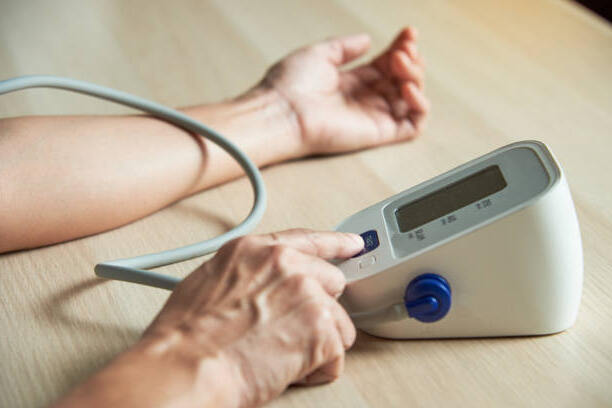 High blood pressure, also known as hypertension, is a silent killer affecting millions worldwide. To manage and prevent it, it’s crucial to regularly monitor your blood pressure levels through a blood pressure test.
High blood pressure, also known as hypertension, is a silent killer affecting millions worldwide. To manage and prevent it, it’s crucial to regularly monitor your blood pressure levels through a blood pressure test.
So, how to pass blood pressure test? To maintain healthy blood pressure levels, you should follow a balanced diet low in salt and saturated fat. You should also engage in regular physical activity and manage stress. This can be done through relaxation techniques such as deep breathing and meditation. Quitting smoking and limiting alcohol consumption can also help pass the test.
By the end of this article, you’ll know how to take control of your blood pressure for optimum health.
Understanding Blood Pressure
Blood pressure is the force of blood against the walls of your arteries as your heart pumps it around. It’s a vital sign that provides essential information about your heart’s health and function. Blood pressure is measured in millimeters of mercury (mmHg) and is recorded in the following:
- Systolic pressure: the first number
- Diastolic pressure: the second number.
Blood pressure is typically measured using a sphygmomanometer, also known as a blood pressure cuff. The measurement is taken by wrapping the cuff around your upper arm and inflating it to restrict blood flow.
The cuff is then slowly deflated, and a measurement is taken when the first sounds are heard.
Here is a table for interpreting the results:
| Systolic (mmHg) | Diastolic (mmHg) | Blood Pressure Meaning |
| Less than 120 | Less than 80 | Normal |
| 120-129 | Less than 80 | Elevated |
| 130-139 | 80-89 | High (Stage 1) |
| 140 or higher | 90 or higher | Hypertension (Stage 2) |
Simple Strategies on How to Pass Blood Pressure Test
Follow the following tips:
1. Follow a Balanced Diet
Here’s what you should do:
- Eat more fruits, vegetables, and whole grains: Aim to consume at least 5 servings of fruits and vegetables daily. Choose whole grains such as brown rice, whole wheat bread, and oatmeal instead of processed, refined grains.
These foods are high in fiber, vitamins, and minerals and have been shown to improve heart health and lower blood pressure.
- Include lean proteins: Incorporate lean proteins such as chicken, fish, and beans into your diet. These foods are lower in saturated fat, which can help reduce blood pressure.
- Limit processed foods: Processed foods are often high in salt, which can contribute to high blood pressure.
- Reduce salt intake: High salt intake can increase blood pressure. Limit your daily salt intake to no more than 2,300 milligrams (mg) per day. Aim to use spices, herbs, and other flavorings instead of salt to enhance the flavor of your food.
2. Regular Exercise
Here is how to exercise when in the process of how to pass blood pressure test:
- Talk to your doctor: Consult before starting a new exercise routine. This is a must if you have any pre-existing health conditions or have been inactive.
- Types of recommended exercise: Some of the best exercises for lowering blood pressure include brisk walking and cycling. You can also try swimming, jogging, and resistance training. Aerobic exercise is also particularly effective at reducing blood pressure.
- Aim for at least 30 minutes of moderate-intensity daily exercise: The goal is to raise your heart rate to make it stronger.
- Mix up your routine: Engage in various activities to challenge your body and prevent boredom. This could include strength training, yoga, or other forms of exercise that you enjoy.
3. Stress Management
Here are some tips for managing stress and reducing your risk of high blood pressure:
- Identify your stress triggers: Take a moment to reflect on what triggers your stress, and find ways to avoid or manage these situations. This could involve adjusting your schedule, changing your environment, or seeking support from friends and family.
- Practice relaxation techniques: Relaxation techniques, such as deep breathing, meditation, and yoga, can help lower blood pressure and reduce stress levels. These techniques work by slowing down your heart rate and reducing the release of stress hormones.
- Get adequate sleep: A lack of sleep can contribute to stress and elevated blood pressure levels. Aim for 7-8 hours of sleep per night. Also, establish a consistent sleep routine to help manage stress and maintain healthy blood pressure.
- Seek support: Talking to friends, family, or therapists can help you manage stress and find healthy ways to cope with difficult situations. Surrounding yourself with a supportive network of people can also help reduce stress and improve overall well-being.
4. Avoid Alcohol and Caffeine
It is well-established that alcohol and caffeine can significantly impact your blood pressure levels. Alcohol consumption has been linked to higher blood pressure levels for those with a hypertension history.
To maintain healthy blood pressure, it’s essential to avoid alcohol consumption.
On the other hand, caffeine stimulates the body and increases stress levels, which can cause temporary spikes in blood pressure. In addition, consuming caffeine before bedtime can interfere with your sleep. This will cause long-term increases in stress and blood pressure levels.
5. Reduce Weight
Here are some tips for successfully losing weight to help manage your blood pressure:
- Keep a food diary: This can help you identify areas where you may be consuming excess calories or unhealthy foods.
- Create a caloric deficit: To lose weight, you need to create a caloric deficit, which means burning more calories than you consume. This can be achieved by reducing your calorie intake and increasing your physical activity.
- Focus on Whole Foods: Whole foods are packed with nutrients and are generally lower in calories than processed or junk foods.
- Incorporate Physical Activity: Do half an hour of moderate-intensity physical activity daily, such as brisk walking. You can also incorporate strength training exercises, such as weightlifting, to help build lean muscle mass and boost metabolism.
- Practice Portion Control: Pay attention to serving sizes and use measuring cups, spoons, and a food scale to help estimate portion sizes.
- Stay Hydrated: Aim to drink at least 8-10 glasses of water per day. Limit your intake of sugary drinks, such as soda and sports drinks.
- Intermittent fasting: This is an effective way to lose weight, improve metabolic health, and lower blood pressure levels. Here, restrict your eating to a specific time window each day, typically 8-12 hours. You should then fast for the remaining hours.
6. Monitor your Blood Pressure Regularly
If you are following up a routine to reduce your blood pressure, it serves it right to monitor it regularly. You could be engaging in a routine which has no results or even leads to more negative readings.
For this, we recommend using the best blood pressure monitor and not mobile apps or smart watches. They are inaccurate. The last thing you would want is false hope from inaccurate positive readings or fear from negative ones.
How to Prepare for a Blood Pressure Test?

Here are some pre-test tips to help you pass a blood test:
Avoid Caffeine, Alcohol, and Tobacco Products
Caffeine, alcohol, and tobacco products can all temporarily raise your blood pressure. It’s best to avoid them for several hours before your test.
Relax Before the Test
Stress and anxiety can raise your blood pressure, so try to relax and take deep breaths before your test. You can also try doing light exercise, such as stretching or taking a short walk, to help reduce stress.
Wear Comfortable Clothing
Wear clothing that does not restrict blood flow, such as tight-fitting sleeves. This will ensure that your blood pressure is accurately measured.
Empty Your Bladder
A full bladder can raise your blood pressure, so make sure to use the restroom before your test.
Know Your Medications
If you are taking any medications, such as blood pressure medication, let your doctor know. Some medications can affect your blood pressure readings.
FAQs
Here are answers to some questions concerning passing a blood pressure test:
Q1: How do you manipulate a blood pressure test?
It is not recommended to manipulate a blood pressure test. Blood pressure readings are an essential indicator of your cardiovascular health. Attempting to manipulate the blood pressure test results can give a false sense of security. This will delay the proper treatment of a potential health issue.
Q2: Does holding your breath lower blood pressure?
No. Holding your breath may temporarily increase your blood pressure, but this effect is not significant or long-lasting. Blood pressure is primarily determined by the amount of blood pumped by the heart.
It is also determined by the resistance of the blood vessels to the flow of blood. Holding your breath will lead to more resistance.
Q3: How often should you get your blood pressure checked?
Getting your blood pressure checked at least once a year is recommended. Do it more frequently if you have a history of high blood pressure or other cardiovascular health conditions. It is also essential to monitor your blood pressure regularly if you are taking medication to control it.
Conclusion
That’s the ways you should follow on how to pass blood pressure test. It’s important to understand that certain conditions can cause high blood pressure. There may not be much you can do to lower it if you have them. These conditions include kidney disease, sleep apnea, and hormonal imbalances.
Ultimately, the key to passing a blood pressure test is maintaining a healthy lifestyle. You should also manage any underlying medical conditions contributing to high blood pressure.
Leave a Reply